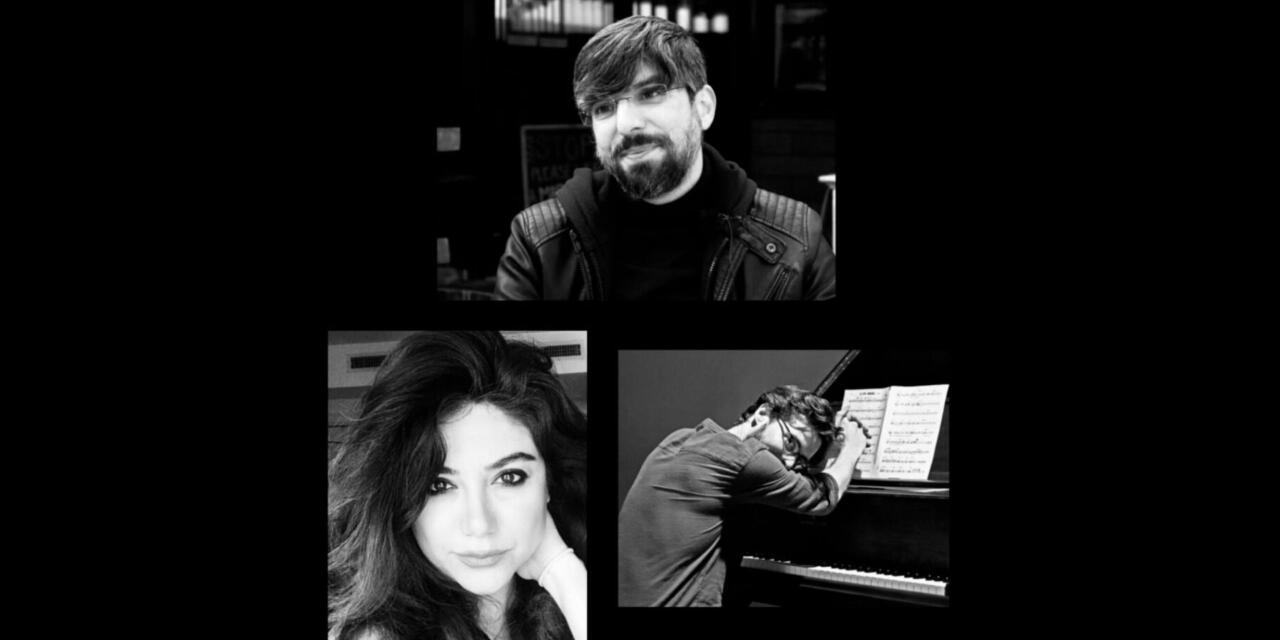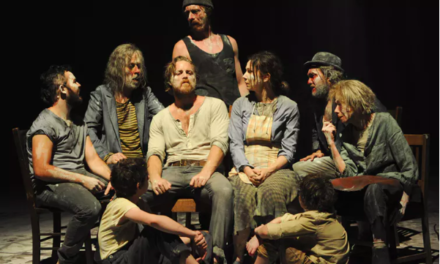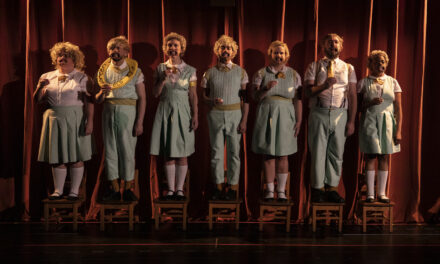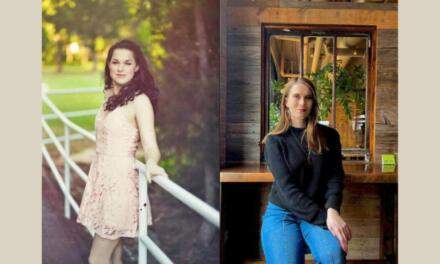Zahhak: The Legend of the Serpent King, will be performed January 12 – 15, 2023, at the Loeb Drama Center’s Experimental Theater located in Cambridge, MA. Zahhak is presented by Boston Experimental Theatre in coordination with American Repertory Theater as part of A.R.T.’s Dialogue of Civilizations program and in conjunction with its production of Life of Pi. The creative team of Zahhak being interviewed: Vahdat Yeganeh is the founder of the Boston Experimental Theatre Company (BETC); Donya Pooli-Yeganeh and Engin Ozsahin are core members of the company. Vahdat and Donya are from Tehran and currently live in Boston. Engin is from Istanbul, lived in Boston for several years, and returned to Turkey in 2020. Heather Waters, the interviewer, worked with BETC as dramaturg of a previous BETC production: M(O)ther.
Heather Waters: This is your second production of Zahhak. The first was presented online during the Covid-19 lockdown. How do you see the relationship between the story and what is happening now in Iran?
Vahdat Yeganeh: In January 2020, we decided to produce and share the story of Zahhak with our audiences in response to what was happening politically in Iran and the United States. The Iranian government started becoming like Zahhak, more so than before. The U.S. government under the Trump administration was also acting like a dictator. As an Iranian-American, who loves both countries deeply, I was very worried for Iran and what could happen to its people. I was also worried about what was happening here in the U.S.
HW: Yes, thank you for bringing up what is going on here in the U.S. too.
VY: As an artist, I feel the responsibility or desire to share my anxieties with my audiences. The story of Zahhak is not just about an autocratic government that eats, metaphorically, young people’s brains. It is also about societies that create and feed this kind of government. Unfortunately, in the history of Iran, we have seen this pattern many times. The most recent one was the 1979 revolution: the Iranians got rid of one dictator, Shah, and put in power another, Khomeini. Here in the U.S., we are also seeing a society that is applauding Trump’s dictatorship. The worst of it was the January 6 insurrection.
This production is a part of A.R.T.’s Dialogue of Civilizations program. Dialogue of Civilizations creates an environment for international artists and thinkers to explore the dynamics of interplay between their cultures to foster global understanding, empathy, and exchange. With this story, and style of production at A.R.T., we hope that our artists and audiences experience the power of storytelling and consider ‘how does telling stories help us cope and survive?’ Unfortunately, today, this story is even more relevant to what is happening in Iran. People in Iran are comparing Ali Khamenei, Iran’s supreme leader, to Zahhak. That is why we would love to dedicate this production to everyone in Iran fighting for their human rights and shouting: WOMEN, LIFE, FREEDOM.
HW: In August of 2020, M(O)ther brought artists from Iran and Iraq together for the first time via Zoom. You were joined by an international cast, including Engin and Donya. Brenna Nicely, an American playwright, put together a bare-bones English script. The actors and musicians involved added poetry and original music. For Zahhak, you are working with an ancient Persian text translated into English. Does the rehearsal process change from how you worked in M(O)ther, now working with a classic script and a much smaller cast?
VY: Our process at Boston Experimental Theatre Company is always the same. Rehearsals begin in an empty space. The director, actors, and designers engage in exercises that explore their thoughts and feelings and allow relationships to develop; our shows grow organically from this intimate and intense atmosphere. BETC believes the theater must be a space where actors and spectators can connect meaningfully to their dreams and emotions at the deepest level. Our productions aim to foster meaningful communication between the actors and the audience to inspire a collective exploration of feelings held captive in the body and the unconscious. Our rehearsal process is designed to meet these goals.
Donya Pooli-Yeganeh: Creating a new play at BETC is about connection and dialogue between all the artists. The first step is the connection you make with yourself and with the emotions, memories, and images that come to you. Then you share them with others. You listen, watch, and feel the response. That’s the time that you start creating a dialogue. About the process of Zahhak: Vahdat designed a series of intense exercises for the first weeks of rehearsals, in which Engin and I could get connected to ourselves and each other by saying any words or playing any notes. The connection is not happening only between performers, but it’s also about the space and all the details, such as lights, sounds, and props that can impact you and how you feel. That’s why what I use on stage are not only props that help me to tell the story, but they are my co-actors! Later, when we started working on the story, all the character development for me as an actor was in relation to what the three of us were discovering and exploring in each rehearsal.
Engin Ozsahin: All the music I’ve created for BETC in the past has formed in the rehearsal room in relation to my feelings, the other actors and musicians in the same space. The music is improvised on the spot from scratch. In Zahhak, it will be the same. Why, you may ask? Because I like the idea of playing something different and new in each of the performances. Improvised music creates an opportunity to better connect with Donya, who might also improvise in various ways during the performance. I think the script creates musical form and a vehicle where Donya and I can co-create using it. So, having one core aspect of the compositional process already figured out, I use that to my advantage. How it comes all together is like this: At the beginning of a performance, I improvisationally explore musical seeds, ideas, melodies that might portray certain characters, events, and my feelings all at the same time. Then that core seed is worked on the spot to create an exposition. Throughout the performance I seek ways to express the core idea in different speeds, shapes, color, texture, timbre and so on. What I practice at home and rehearsals is exactly this.
HW: BETC is influenced by Jerzy Grotowski’s “Poor Theatre.” Could you talk a bit about how Grotowoski’s approach to directing inspires your work together?
VY: In Grotowski’s work, the actors’ body is the main resource to develop the characters, analyze the script, and find movements that serve the play. In my work over the last fifteen years, mostly because I am strongly inspired by jazz, I applied the same Grotowski exercises to the musicians I worked with.
I like to think of this production as a Jazz-Theatre. A jazz duet between Engin and Donya. Their bodies are the main sources to connect to this ancient Persian story in our time and themselves, to find different layers of colors, emotions, sounds, and actions.
This production is also inspired by an ancient Persian style of storytelling known as Naghali. Naghali used to be performed in tea houses in Iran. Naghal, the person that does Naghali, would have different paintings of Shahnameh behind him, and most of the time, he would only have one cane or a long piece of wood as a prop and tell different stories from Shahnameh through his body.
HW: Zahhak being one story of many in the epic poem Shahnameh by Ferdowsi.
VY: For me, Zahhak is one of the most important stories in Shahnameh, with a psychological and political depth that makes it universal and timeless. It is sociologically one of the best sources to understand Persian societies in the last one thousand years, to understand the political world around us. I am very honored and looking forward to the post-show talk we have after the Saturday performance by Dr. Siamak Movahedi entitled, The Ghost of Zahhak in the Age of Totalitarianism.
DP: Zahhak is a story that we are living again and again through a thousand years. And sharing it with our audience was a response to this time and what is happening today all around the world.
EO: Zahhak’s story is a way to understand our own life story and explore how others interpret theirs. For the performance, ours become the counterpoint to Zahhak’s and that’s what we try to share with the audience.
HW: (to Donya) In addition to being an actor and dancer, you wrote a play, Poor Connection, with Nikta Sabouri and Parisa Bayenat–two Iranian-born theater artists who also emigrated to Boston. Violence against women and mother-daughter relationships were two major storylines. I remember the relationship between deep loss and new independence haunted the play–as did the sense that danger was not over.
Donya: As an Iranian female artist, I have fought my whole life not to be invisible, to have an identity in a world that constantly tries to censor my body, voice, ideas, and thoughts. After living in an environment that constantly put limitations on me and censored me, I started experiencing self-censorship. Theater, for me, is the way that I practice my freedom. I challenge myself and face my fears in every production to go beyond my internal glass ceiling. Maybe that’s why these themes dominate most of my shows.
HW: (to Engin) Is Shahnameh a well-known poem in Turkey? How do you relate to the story of Zahhak?
EO: So far, I’ve met only one person who heard of Ferdowsi and Shahnameh in Istanbul. Before I met Vahdat and Donya, I didn’t know about it either. For a story as old as 1,000 years, you can still see the societal dynamics we live through every day at play in Zahhak. There’s him taking hold of power by force, creating new rules to prolong its dynasty, and changing the moral norms to which the people operate. There’s the community, offering Zahhak a place among their ranks to rule them, believing it will bring a prosperous future. Then, there’s revenge seeking Feraydun, who goes after Zahhak. There’s Kaveh the blacksmith, who helps Feraydun by bringing the community together on the streets.
I’m intentionally not going into too much depth here, but I feel like the patterns portrayed in Zahhak are what we see in our daily lives, whether it’s politicians, monopoly (or monopsony) seeking corporations, a community coming together to fend off an ideology, and so on. Living in Istanbul, I’ve experienced my share of political events from Gezi Park protests in 2013, to the failed coup d’etat attempt in 2016, and repeating economic crises over the years. These events pass on and people get used to them after a while, and the same is true for me. Getting used to them means that I forget or lose my emotions towards these events. Just as history is easily forgotten, emotions can be, too. So, going up on that stage and performing for an audience is a way to remember all that history. This is important because it will somehow repeat itself.
HW: New York Times’ columnist Nicolas Kristoff wrote a harrowing account of how the Iranian regime is using torture and rape to intimidate protesters, often teenage girls. These are also news reports of executions and disappearances of protestors. Kristoff used his column to express surprise and disappointment that Americans aren’t being more supportive of the uprising. What would you like to convey to Americans with this production?
VY: What I hope to achieve for the production, as a Dialogue of Civilizations production, is our audiences feel how close we are to one another. Regardless of our locations, the color of our skin, or our religious and political views, our psyche is the same. We are all humans. Together, we are stronger and healthier. We can learn from one another and our history to build a better place to live for ourselves and generations to come. It is important for people living here in the U.S. to stop talking about Iranians and the Middle East as if they belong to some faraway exotic culture. We need to see the Iranian struggle as synonymous to ourselves.
DP: Fighting for gender equality doesn’t belong to any specific geography. All around the world women are fighting for the same rights. The right to live free from violence, the right to have access to safe abortion, the right to not wear the headscarf or to wear it! Women in Iran are fighting for the same rights that we are fighting for here. Here women are shouting: “My Body, My Right” and women in Iran are chanting in the streets: “Woman, Life, Freedom”! We are aiming for the same goal. I was in Iran when the “Me Too” movement happened, and it had a great impact on women in Iran. I believe what is happening in Iran right now can influence women all around the world. That’s why we need to share their stories and make sure their voices are heard.
EO: One of the exercises during the rehearsals for Zahhak was to gather around and simply read the script out loud in turns, subsequently sharing whatever we thought and felt about that part of the story. What got shared generally happened to be something of a personal note that made it possible to understand where we come from in life. I’ve learned so much about myself from listening to Vahdat and Donya’s stories as well as where they come from and how they think and feel towards the world. So, isn’t it possible that a simple exercise like this could happen more often among ourselves with others?
HW: How much are you thinking about your friends and family at home as you rehearse? (Vahdat and Donya are married).
VY: Every day. It is very frustrating to see and hear what is happening in Iran and not be able to do much. We are trying to connect to our communities as much as possible to let them know what is happening in Iran and to share their stories. We believe more attention from the world will make Iranians stronger, and the Islamic Republic of Iran weaker. Also, it is important to acknowledge that not all people are the same and want the same thing. It is the same in Iran. We all know that most Iranians are desperately tired of this dictatorship and want to overturn this regime. But how and what to come after is not very clear. I believe it is the responsibility of people living in the diaspora to observe what is happening in Iran, listen to them, and follow their leads, rather than think for them and tell them what to do.
DP: The last four months were the hardest time of my life. The images of tragic events and news that come from Iran are hunting me. I live in fear every day about when will be the next time I can visit my family and friends in Iran. But I was so fortunate to have this show to work on. It helps me to be resilient. I brought all my fears, anger, pains, and hope to the rehearsal room and put them through the lines of the story. Telling the story of Zahhak helped me to survive the last four months.
HW: When it comes to the classics, American theaters often produce ancient Greek dramas and Shakespeare. It would be fascinating if our staple international theater canon contained more classics from non-European countries. For instance, if only Zahhak, one story in Shahnameh, were added to the canon, I think this addition would have a profound impact on Americans’ understanding of global politics and world culture.
VY: I totally agree. It is disappointing to see how little Americans know about Iranian theater. This is exactly why I chose this play for Dialogue of Civilizations: to introduce a masterpiece story by Ferdowsi, and Naghali, an ancient Persian storytelling style, to American audiences. I understand that Iranian and American politicians have been at war for more than 50 years. But I never understood why more artists from both countries are not trying to create a bridge to get to know each other better, and to collaborate more. Regarding countries like Iran, here in the U.S., we hear about their extremist religious ideas and terrorism, but rarely do we know about their art and culture. Maybe it is because it doesn’t sell much, I don’t know!
HW: Donya, a woman, is playing all parts of Zahhak. Engin’s music for Zahhak is highly influenced by American jazz. What are you, as the director, saying by these artistic choices…to move away from a traditional telling of the story?
VY: Naghali in Iran was traditionally played only by men and with traditional Persian music. It was a choice to tell this story with a female actor from Iran in English. Donya’s understanding and experiences as an Iranian actress bring so much authentic color and emotion to this text. Audiences will hear the story in English with a Persian accent full of Persian coloring and shapes. Donya also brought a deep analysis of the story that is very often told by men about men. Donya being in rehearsals with us made us all pay a lot more attention to the female characters and make them stronger. Donya would not be able to play this role the same way in Iran, because of the limitation created by the Islamic Republic of Iran for women. That freedom here on the stage brought much more energy to her acting. Also, American audiences get the opportunity to see an Iranian actress on the stage and see they are no different than other women here in the U.S.
As for the music, I have to be honest and say jazz is my favorite style of music. I understand America and its culture through jazz. With jazz comes the best form of art based on respect for individuality while collaborating as an ensemble. My rehearsals are inspired strongly by jazz and its concept of improvisation. I also have known and collaborated with Engin for a few years on many projects. He is one of the best collaborators I ever worked with. That is why from the beginning, it was clear to me that I wanted this production to be a jazz-theatre with Donya and Engin. This production creates a dialogue across cultures in both story and form.
This post was written by the author in their personal capacity.The opinions expressed in this article are the author’s own and do not reflect the view of The Theatre Times, their staff or collaborators.
This post was written by Heather Waters.
The views expressed here belong to the author and do not necessarily reflect our views and opinions.


















